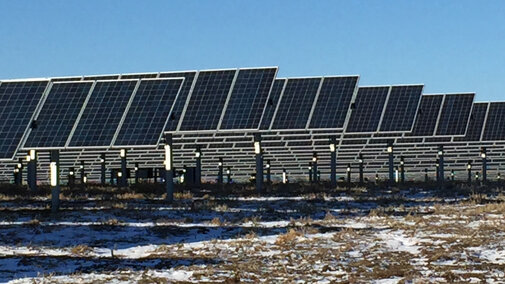Can we lease your land for a solar farm?
John Hay, Nebraska Extension Educator for Bioenergy, outlines solar lease considerations for rural landowners in this Market Journal piece.
That’s a question more and more Nebraska farmers are hearing from solar development companies. The increased interest is largely due to a dramatic decrease in solar development costs. Currently there are five solar farms in Nebraska producing at least 100 killowatts annually and a dozen small personal or business solar installations.
With farm profits expected to be lean for several years, such opportunities may look like an enticing means to add a little income to your operation. Before you sign on the dotted line, make sure you have a good understanding of what’s involved and that the contract clearly addresses key points.
Signing a 20-50 year lease means the details will be something your kids and your grandkids may be dealing with too. There’s a high likelihood that the company leasing your land won’t be the company developing the solar farm and selling its energy or the construction company actually installing the solar panels. Concerns you discuss with the leaser may not be shared with all parties.
In addition, it may be a number of years between when the land is leased and development starts or, in many cases, the land may never be developed for a solar farm. When questions come up later, the written document is the only thing you have to fall back on.
Key to a fair land lease agreement are the issues of:
- land use impacts,
- duration of agreements,
- landowner obligations,
- compensation, and
- decommissioning.
Solar Lease Considerations
Note: The following educational information does not constitute legal advice.
If you're interested in pursuing a solar land lease, before you sign consider these points and address them in the contract as appropriate.- Development of solar facilities may lose the land’s status to qualify for preferential assessment as agricultural land. Consider including lease terms obligating the solar developer to pay all increased property and personal taxes including any recapture of prior years’ preferential assessments and taxes resulting from any increased valuation reflecting the solar facility installation.
- Solar facilities may require fencing to protect solar facilities from agricultural livestock and operations. Consider including lease terms obligating the solar developer to install and maintain appropriate fencing.
- Solar facilities may require restricting aerial application of agricultural chemicals in order to protect solar modules. Make sure solar lease payments include potential increased costs associated with non-aerial application of agricultural chemicals.
- Consider inclusion of escalator for long-term solar lease payments to at least reflect inflation. Consider including lease provisions obligating the solar developer to control and assume legal responsibility for changes in storm water runoff patterns associated with the solar development.
- Spell out the solar developer’s responsibility for decommissioning the solar facility. Require property to be restored to original condition or appropriately modified condition such that normal farm and ranch operations may be reestablished without limitation and without significant expense by the landowner.
- Solar access may involve restricting the use of adjacent properties. Make sure the owner or land operator understands these restrictions and how they may restrict the use and value of adjacent properties.
- Prior to signing an agreement consider how the agreement impacts your taxes, insurance, federal agriculture programs, and other property rights such as oil and minerals. Visit with professionals about how solar leases may impact you in these areas.
We cannot overemphasize how important it is to have solar leases and associated legal documents reviewed by an experienced attorney. These are long-term agreements that will likely restrict your use of your own property for decades to come. You need to understand how the solar development will affect all of your property and it is impossible to do that without the assistance of an attorney.
Questions to Ask
(from materials originally developed by Cornell Extension)
- What is the term of the lease? Can it be extended, and under what conditions?
- Who is responsible for the potential increase in taxes as a result of the solar farm?
- Who is responsible for maintenance of the solar farm?
- Is the solar farm location designated prior to signing a lease?
These are just a few of the questions you'll want to discuss before leasing land for solar development. Find the full list and additional information in the Bioenergy Crops section of CropWatch.
Why the increased interest in solar power now and why in Nebraska?
The price of solar technology has decreased dramatically in recent years, making it a much more attractive source of renewable energy. Solar has low maintenance costs and its peak generating period generally meshes with peak consumer needs. On a hot sunny day in August, both need and solar power will peak.
Nebraska is generally considered in the medium range of favorability for solar projects. While it has more sunny days than the eastern US, it has fewer days than states to the west.
What affects why one leased land parcel is developed into a solar farm while another is not?
The process from leasing land to developing a solar farm includes several stages. First, a company leases land tracts in an area where they believe an electrical utility may eventually be interested in developing alternative energy sources.
Next, an energy company might advertise that it would like to buy, for example, 5 megawatts of solar power for a 20-year period. The solar company could respond with separate bids for developing each of the tracts for which it has a contract. If a bid is selected by the energy provider, development would start on that tract. The other tracts might never be developed.

